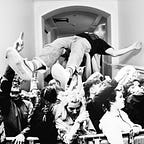Computer Code has Complex Characteristics, so go to CodeCademy
NOTE: The first part of the blog is an existential rant, skip to the second half for what I actually think about CodeCademy.
Everything in our world — object, process, thing ever created, it’s amazing how much work goes into human creation. The simplest of things, a desk for example, has to go through a rigorous process of
- Chopping down wood
- Furnishing the Wood
- Assembling the Wood
- Mining steel
- Furnishing steel for bolts
- Assembling the bolts
- Designing the table
- Building the table
- Packaging the table
- Shipping the table
Did I miss something? Probably not. I’d argue that the steps I’ve listed are the bare minimum requirements for table crafting, so god knows what else IKEA does.
The point is, society grows exponentially in complexity, and much like how each physical thing has a process, everything in our digital lives is no different. From the phones we’ve grown addicted to, to the laptops we can’t live without, our daily lives are entangled with computer code. We’ve got billions of for-loops to refresh our bank accounts, an endless amount of if-then-statements on Tinder to find true love, and all the while, experiencing an inconceivable amount of variables cosmically bound to the state of being human. Computer code surrounds us, and while it’s invisible to our naked eye, we breathe it every second. Some even believe we are the code.
Now, you’re probably confused what an existential rant has to do with learning code at Codecademy. Well, it’s simply what I kept thinking about when trying to understand the difference between css and bootsrap. Not kidding.
Anyways, back to the regular scheduled program (for the one person who reads this, please tell me you got that). So, like I briefly mentioned in the beginning, this is the part where I go into detail about Codecademy.
It was a very enjoyable experience.
The course I decided on was “Making a Website,” using basic principles from html, css, and bootsrap. Codecademy has an extremely beginner-friendly method of explaining and displaying each singular line of code, before jumping into bigger concepts. It made understanding every single line I wrote a lot easier, and although I have background knowledge of Computer Science from high school, I still believe Codecademy is a great place to start for first-timers. For those who enjoy making things, learning to code is a really enjoyable skill. Whether you’re creating a program or a website, every time you hit “run”, it’s fun to see the progress each singular line of code makes.
In about an hour or so, you learn the basic principles for creating nice, modern web pages, and honestly, I plan to continue learning it so I can design my own website soon. Codecademy also has an achievements system going on, just to encourage you to keep going.
The accessibility of online learning platforms such as Codecademy really sets it apart from traditional methods. Being able to learn how to code, on pretty much any computer, any where, is extremely significant when discussed in the context of the Digital Divide. If students in developing nations are given access to these platforms, it could really accelerate the closing of the divide and provide opportunities for those who may not have ever considered becoming a programmer.
